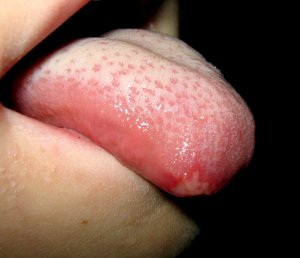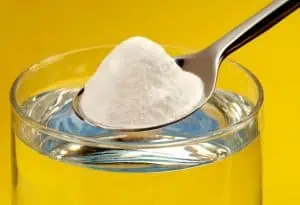Can you use hydrogen peroxide as mouthwash for your oral health? The answer is yes—but not too often and only when heavily diluted. And for goodness’ sake don’t swallow it!
Whether you’re wondering about hydrogen peroxide mouth rinse because you’re tired of spending money on big branfd names, or you want to soothe sores, freshen breath, or whiten teeth, you may be considering this medicine cabinet staple. In this article we’ll answer your questions including:
- Can you gargle with hydrogen peroxide?
- Can you use hydrogen peroxide for mouth sores?
- What are the risks of using hydrogen peroxide as mouthwash?
We also asked dentists what they think about using hydrogen peroxide as a mouthwash in order to find out once and for all if this is the best solution for our mouths.
Short on time? Have a look at our roundup of the best hydrogen peroxide mouthwashes based on your needs:
Best overall ➡️ Crest Pro-Health Advanced
Best whitening ➡️ Colgate Optic White
Best organic ➡️ Essential Oxygen BR Rinse
Best gentle formula ➡️ Prevention Daily Care
Best for mouth sores ➡️ Oral-B Mouth Sore Oral Rinse
Best holistic ➡️ GuruNanda
In This Article
What is hydrogen peroxide?
Hydrogen peroxide is an oxidizing agent that has disinfectant, antiviral, and antibacterial properties. It is also a mild antiseptic with a variety of household uses, including cleaning countertops and preventing infection in minor cuts and burns.
In diluted concentrations, with degree of dilution depending on usage, it should be safe to use but may burn skin and should never be swallowed.
Hydrogen peroxide is related to carbamide peroxide. Both have whitening qualities but work slightly differently. Read more about carbamide peroxide vs carbamide peroxide.
Benefits of hydrogen peroxide as a mouthwash
The benefits of a mouth rinse made with hydrogen peroxide for dental health include:

- Soothing sore throats: HP has antibacterial properties that help your body fight off infections that cause sore throats. It also helps hardened or thick mucus in your throat loosen and drain better, relieving irritation.
- Treating gum disease: Because of HP’s antibacterial properties, it can also help treat gum disease and improve oral health. A study in Scientific Reports found that HP made participants’ gums healthier and reduced amounts of the periodontal pathogen Porphyromonas gingivalis, which causes gingivitis.
- Healing canker sores: HP is antiseptic, which helps heal cuts and canker sores. When applied to a cut or sore, the HP foams and releases oxygen, which helps clean the area and reduce bacteria.
Risks of using hydrogen peroxide mouth rinse
- Harmful when ingested: Swallowing too much HP can cause serious side effects, including burning of the digestive tract, nausea, and vomiting.
- Black hairy tongue: This is a harmless and temporary oral condition that looks a lot worse than it is! It can happen when using mouth rinses with oxidizing agents like peroxide.
- Weakened enamel: Hydrogen peroxide can damage tooth enamel if used for too long, too often, or in too high concentrations.
What are dentists saying?
To begin with, Dr J. Salim from Sutton Place Dental Associates says that not all dentists agree about the safety of hydrogen peroxide. He says that 1% HP solutions are excellent antibacterial agents, but they shouldn’t be used too often or for too long.
That’s because it can penetrate the enamel, dentin, and collagen-rich tissue found within the dentin, damaging it as a result. He also doesn’t recommend rinses with hydrogen peroxide to whiten teeth because “to obtain meaningful teeth whitening results with HP-based mouth rinses, you would need high concentrations which could harm your oral mucosa.”
He goes on to say that higher concentrations are safe for professional dental use because your gums are protected with hardening resins or a liquid rubber dam.

Another dentist, Dr. Sonal Bhoot from Dental Expressions Leawood, agrees that a hydrogen peroxide mouthwash can reduce bacterial growth, but he is more generous in promoting it as a way to whiten teeth—only, of course, when used with the “utmost care and precaution.”
Dr. William Cranford from Cranford Dental says “Hydrogen peroxide lowers the level of bacteria in the mouth for a short period.” For this reason, in fact, during the COVID pandemic, he and his team are asked patients to gargle with a hydrogen peroxide mouth rinse prior to going in for dental treatment.
Before gargling with peroxide, Dr. Cranford advises mixing water with a 3% hydrogen peroxide solution to obtain a 1% solution. At that percentage, he says, hydrogen peroxide is no longer carcinogenic.
He goes on to say “If it makes your mouth feel better, use HP as a mouth rinse; however, this does not clean the teeth like brushing does. We do not recommend HP for bleaching the teeth or to deal with decay or sore teeth or gums.” He also warns that using it too much can turn your tongue black!
Finally, Dr. Esteban Kosak from Symptoms Care says that “using hydrogen peroxide with regular brushing and flossing reduces gum inflammation.” He also says that it can whiten teeth, but using it every day will negatively impact your oral health. In fact, he recommends limiting use to just a few times per month.
Of all of the dentists we asked, most could agree that HP mouth rinses:
- Are not recommended for teeth whitening
- Shouldn’t be used as a mouth rinse in concentrations of more than 3%
- Should NEVER be swallowed
- Reduce levels of bacteria in the mouth
- Can temporarily help with gum inflammation and gingivitis
- Can help soothe a sore throat
And if you’re wondering exactly how hydrogen peroxide works, check out the brief video below where Dr. Eric Berg explains how it kills bacteria to help soothe sore throats and infections.
How to use hydrogen peroxide as a mouthwash
So how should you use hydrogen peroxide for mouthwash for better oral health and hygiene?
- Mix 1 part 3% peroxide solution with 2 parts water. (If you purchase a 1% solution, you don’t need to dilute it).
- Don’t use every day, except for short periods of time if you have a sore throat or inflamed gums.
- Swish for 30 seconds and then spit out. Make sure you don’t swallow it!
Alternatives to hydrogen peroxide
If you’re attracted to the frugality and simplicity of this DIY mouth rinse with HP but not so attracted to the actual HP itself, there are plenty of alternative homemade mouthwash options as well. Let’s have a look!
Baking soda mouthwash

You can make a simple baking soda mouthwash by mixing together 1/2 teaspoon baking soda and a half a glass of warm water.
Just stir them together and swish for 30 seconds. This mouth rinse can soothe gums and canker sores, including mouth irritation caused by cancer treatment.
It can also be gargled to soothe a sore throat and to get rid of bad breath. Baking soda is alkaline, so it will neutralize acids that irritate sores and kill bad bacteria so you can heal faster. Unless directed by your doctor, this mouth rinse is for temporary use.
Saltwater rinse
An even easier natural mouth rinse to throw together is saltwater. Saltwater is another remedy for sore throats, canker sores, and inflamed gums, as it has antibacterial and healing properties.
It creates an alkaline environment in your mouth so acids won’t cause more irritation. This is another rinse meant to help your mouth recover temporarily, as long-term use could weaken your enamel.
Natural mouthrinse options
If you aren’t averse to purchasing a mouthwash, there are plenty of natural options that are affordable, free of harmful chemicals and that can safely be used on a daily basis while providing many of the same benefits as hydrogen peroxide (but without the risks).
This mouthwash is made with aloe, coconut oil, neem and activated charcoal to soothe teeth and gums and keep them healthy too. Plus it’s got a gentle mint flavor that will keep breath fresh all day.
Should you or shouldn’t you?
Our takeaway after interviewing dentists, reading studies, and even consulting one of our own team members is this:
You can use a hydrogen peroxide mouth rinse, made with a maximum 3% HP and diluted with two parts water, to ease pain and facilitate the healing of oral cuts, canker sores, sore throats, and inflamed gums.
You should only use this mouthwash until you are feeling better, as prolonged use can damage your tooth enamel.
Furthermore, HP mouthwash is not recommended as a tooth whitening solution because to see results, you’d have to use it for an extended period of time or at a much higher concentration.
You can have a look below for a summary of the pros and cons of hydrogen peroxide mouthwash:
Pros | Cons |
Soothes sore throats | Harmful when swallowed |
Combats fungus and bacteria | Prolonged use could damage enamel |
Helps treat gum disease | Could cause black hairy tongue |
Helps heal canker sores | |
May reduce the spread of COVID from patients to dentists |
Conclusion
You can find hydrogen peroxide in 1% and 3% solutions. When diluted with water, the 3% solution can be used as a throat gargle or mouth rinse to ease pain, reduce irritation, and facilitate the healing of sores and cuts by eliminating harmful bacteria. The 1% solution can be used as-is for the same purposes.
While dentists use hydrogen peroxide for teeth whitening, home mouth rinse will not likely have a very noticeable effect on tooth color, as the percentage used by dentists is much higher (around 25%).
Nor should you attempt to use such a strong solution at home, as you could end up seriously burning your gums or skin, permanently damaging your teeth, or injuring your internal organs.
The bottom line is that when used in highly diluted solutions (and only temporarily), hydrogen peroxide is safe and effective for soothing and healing sores, inflammation, and cuts.
Is it safe to gargle with hydrogen peroxide?
It is safe to gargle with hydrogen peroxide to ease sore throats. You should use a solution of 3% concentration (maximum) and dilute it with two parts of water. Don’t gargle hydrogen peroxide for more than 30 seconds and make sure not to swallow any of the solution.
Do you rinse your mouth with water after using hydrogen peroxide?
There is no strong or unified opinion among dentists as to whether you should rinse with water after rinsing with peroxide. The important thing is to not rinse for more than 30 seconds. Do not to rinse habitually over long periods of time, make sure you use a diluted solution, and make sure to not swallow any.
Can you use hydrogen peroxide for oral thrush?
The antiseptic benefits can help you keep your mouth clean if you have oral thrush and relieve symptoms. However, if your thrush symptoms persist, you need to see your doctor.
How do you make a homemade mouthwash with hydrogen peroxide?
To make your own homemade mouth rinse with HP you need one part 3% hydrogen peroxide and two parts water. You swish for 30 seconds (don’t swallow), and don’t use for long periods of time.
Mayoclinic.org: Black hairy tongue. Consulted 19th October 2020.
Bmj.com: COVID-19: What treatments are being investigated? Consulted 19th October 2020.
Nature.com: Adjunctive antimicrobial chemotherapy based on hydrogen peroxide photolysis for non-surgical treatment of moderate to severe periodontitis: a randomized controlled trial. Consulted 19th October 2020.




